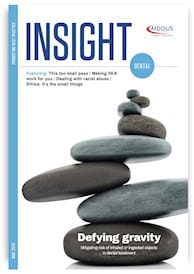SIGNIFICANT event analysis (SEA) is now (hopefully) embedded as an ongoing process which supports complaints handling and acts as a collective learning exercise within the dental practice environment. But when was the last time that you took stock of how much value your practice is getting out of the process?
Many of the SEAs we see at MDDUS in our role assisting members with potential dento-legal and medico-legal cases are more of a description than analysis. A lack of analytical rigour in SEAs, if routine, can lead to poor engagement in the process with much less learning and a reduced impact on patient safety. If your practice is sleepwalking through SEAs, consideration of the following can help.
HOW ARE EVENTS TARGETED FOR ANALYSIS?
Factors at play here include the use and effectiveness of your incident reporting processes. Does the team understand what to report? Are low level incidents, near misses and ‘good catches’ being collected as well as significant incidents for thematic review? There is some evidence that unless there is a significant proportion of these incidents, it may be that your processes are not sensitive enough.
Among additional benefits in capturing lower level but repetitive incidents is the identification of training needs, system reviews, and also a reduction in unnecessary follow-up activities. Practices should also consider who captures and reports incidents. Are the same people putting forward the same events for discussion or do SEAs cover the full range of activities undertaken by the practice? Does your organisational culture support reporting? Staff who feel unsupported are much less likely to report an incident in which they were involved.
It can be helpful to nominate a member of the team to review all reported incidents on a regular basis in order to identify any themes. Particular systems or protocols associated with lower level incidents can then be targeted for analysis, and solutions presented for a sense-check at team meetings. Highlighting efficiencies and safer protocols adopted as a result of such reporting can encourage future engagement. Reviewing the ease of reporting is also important: achieving a balance between simplicity and gathering sufficient data is crucial. Depending on the complexity of the event, further factual information may need to be gathered, particularly when more in depth analysis is required.
WHO DO YOU INCLUDE IN THE PROCESS?
Some clinical incidents may be too sensitive for discussion in a wider team setting, but should an SEA involve nonclinical systems it is essential that a suitable member of the non-clinical team is involved to ensure that any changes are sensible and do not create additional risks. Alternatively, clinical SEAs or non-clinical SEA outcomes can be shared with the wider team at regular practice meetings. Either way it is important to ensure changes are properly communicated, understood (and embraced) by the wider team.
Routine SEA meetings involving the full team should include a range of topics or potential risks (errors) over a set period of time (e.g. a year cycle). This will ensure that no one feels left out or unengaged in the process. In some dental surgeries this can be part of regular practice meetings.
HOW IS THE SEA MEETING STRUCTURED?
Many practices use similar styled templates for structuring conversation and analysis around significant events. Questions could include:
- What happened?
- Why?
- How could things have been different?
- What can we learn from what happened?
- Is change required, if so, what?
- How will we implement this change?
- How will change be monitored?
An open and inclusive learning culture with a positive team dynamic is a major factor in the success of such meetings. It’s also useful to collect as much relevant information as possible beforehand in order to maximise the quality of discussion. This could include more detailed written statements, copies of current policies or other records, as appropriate.
IS THE MOST COMPREHENSIVE LEARNING EXTRACTED?
Often only superficial learning and training opportunities are identified through the SEA process. What went wrong may be put down simply to: “the process or protocol wasn’t followed” or “the person should have asked for advice from a colleague at the time of the incident”. Subsequent learning is then noted as: “the protocol should be followed in these circumstances” or “in future a dentist should be asked to speak to the patient if they present in this way”. Such conclusions may be true but unless “why” questions are asked many incidents are more likely to reoccur.
This is because in most scenarios there will be other underlying factors that contributed to the adverse incident. Such factors usually range across:
- People – the specifics of the patient or the team member involved.
- Activities – the task(s) or process being engaged in at the time.
- Environment – the setting or situation within which the incident occurred.
Asking “why” multiple times will help draw each strand of an investigation to its natural start point. Indeed there is evidence that asking “why” five times is the optimal strategy to achieve deeper learning and a root cause.
Exploring the contributory factors more fully could lead to findings such as: “the protocol was not followed because the individual was under too much pressure” or “the dentist was not consulted for advice because the receptionist was aware that they were over-booked and running late, and didn’t like to approach them”. In the latter example, asking why is likely to identify potential system issues relating to bookings, as well as whether the receptionist needs support to be more assertive, whether there should be an agreed protocol for interruptions, or whether the dentist needs to adjust their response to interruptions.
Identifying such underlying issues can often be uncomfortable and challenging to resolve. They may relate to deficiencies within practice management/leadership, practice protocols, or issues created by stress/overload. Such factors will increase the risk of future incidents if not recognised and resolved.
ARE OUTCOMES BEING MAXIMISED?
To ensure that any lessons learned from incidents are cascaded properly, the practice should agree a mechanism by which staff not directly involved in an SEA still receive an update. Any amendments to protocols or practice systems should include clear information about the efficiency, effectiveness or patient safety gain from the proposed change, as this is likely to encourage compliance.
Sometimes, research or audit is required to assess the extent of any issues identified, or further training will be necessary to support improved practice. It is important to agree a timescale within which this should be completed, and an individual should be appointed to make sure it happens and is reported back. At the end of the review, an anonymised written record of the analysis, including insights gained, lessons learned and actions agreed should be completed and retained securely.
There are obvious benefits to gaining insights and learning from events. If there is a patient complaint, and there is learning from that complaint, it is very powerful to share that learning with the patient as part of the complaint response. Learning from events can also be used by dentists and other dental care professionals as evidence of reflective practice.
Should you need assistance in reviewing your incident reporting system, members can access our incident reporting checklist in the training and CPD pages at mddus.com. Getting this right will set your efforts off in the right direction.
Liz Price is senior risk adviser at MDDUS
This page was correct at the time of publication. Any guidance is intended as general guidance for members only. If you are a member and need specific advice relating to your own circumstances, please contact one of our advisers.
Read more from this issue of Insight Dental

Save this article
Save this article to a list of favourite articles which members can access in their account.
Save to library

